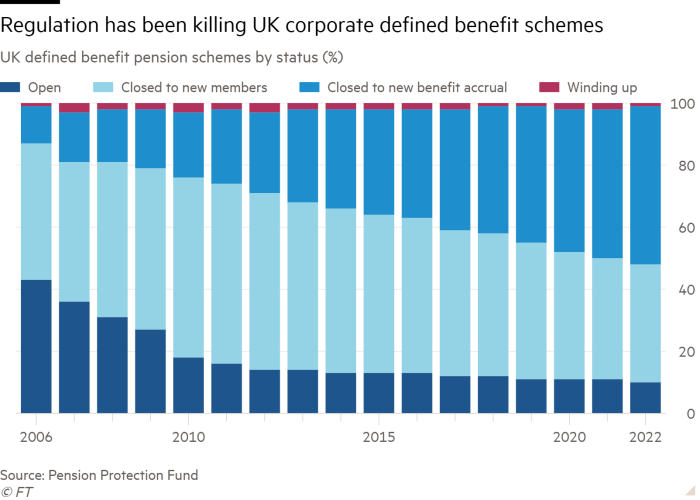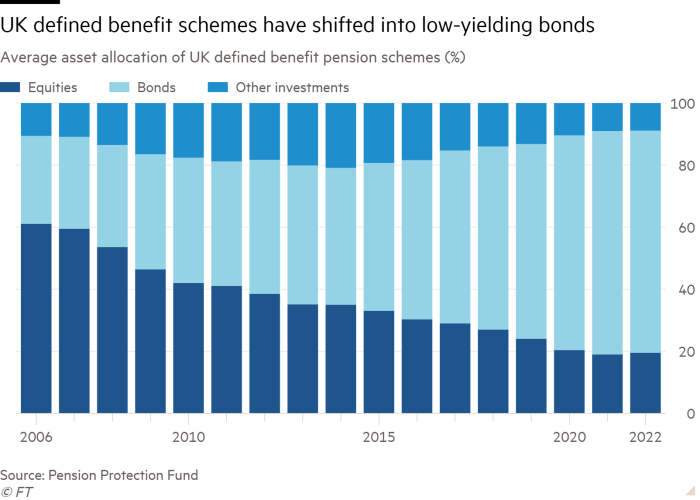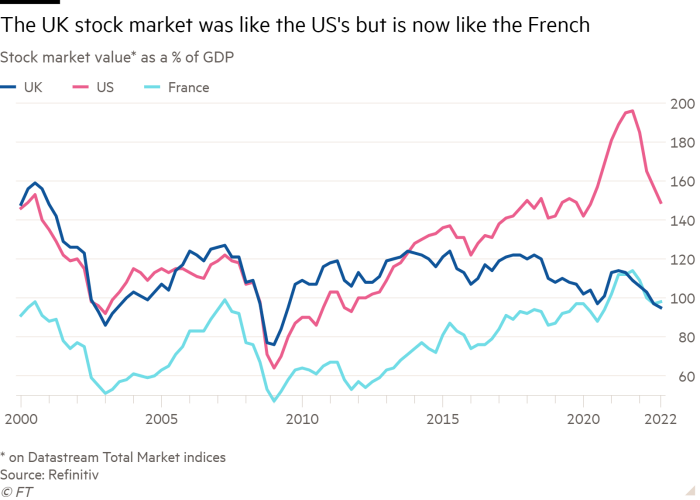[ad_1]
What would be a sensible growth strategy for the UK? For an answer, forget what Jeremy Hunt, chancellor of the exchequer, said in his Budget last week. Turn instead to A New National Purpose, a report from Tony Blair and William Hague. The big lesson from this report is that after a long period of disappointing performance, the country needs a more radical approach. They are right.
Among the most important areas where the UK lacks a sensible strategy is pensions. It has consistently answered the wrong questions, with dire results for both the economy and for people.
Once, the question was how employers were to provide salary-linked pensions to their employees. The answer meant 7,751 defined benefit funds in 2006. Then the question was how to make those pensions safe. The answer was to slash the proportion of funds open to new members and new contributions from 43 per cent in 2006 to 10 per cent in 2022 and to reduce the share of assets invested in equities from 61 per cent in 2006 to 19 per cent in 2022. The price of making DB pensions perfectly safe was to turn them into financiers of the government, while killing them off.
Then the question was how to get people to save for pensions on their own. The answer was the creation of defined contribution funds in which individuals bore the risk, contribution rates were too low and pensions would be inadequate. Meanwhile, public sector workers get index-linked pensions that they do not even seem to value that much.
The UK pension system is incoherent, fragmented and risk-averse. Not surprisingly, Blair and Hague note, “overseas pensions invest 16 times more in venture capital and private equity in the UK than domestic public and private pensions do”. This is madness.

Between the third quarter of 2000 and the last quarter of 2022, the value of the stock market in the UK also fell from 159 per cent of GDP to 95 per cent. Over the same period, the US ratio went from 153 to 149 per cent, while the French ratio stayed at 98 per cent. Thus, the UK market has moved from being like that of the US to being like the French. The FTSE 100 is a corporate museum, not a home of dynamic new businesses. It is implausible that new large domestic companies will emerge without domestic pools of patient, committed capital.
The underlying mistakes are characteristically British. First, policy is made piecemeal, rather than systematically. Second, there is over-reliance on the rationality of financial markets and so on the existence of a measurable “equity risk premium”. Finally, there is a tendency to focus on details rather than on the big picture. A sensible national pensions policy must deliver two things: security in old age and a more dynamic economy. This is feasible. But it will not happen without a new approach.

The answer, as I have argued before, lies in creating a limited number of large collective defined contribution funds. These would be eternal. The contributions of active members, plus the higher expected returns on equity, would allow such funds to provide (reasonably) predictable — though also, when necessary, adjustable — pensions. In return for the tax benefits granted by the government, these would be required to invest a certain proportion of their funds in new and dynamic businesses. But decisions on where and how to do so would rest with the funds. Given their economies of scale, such funds should be able to identify and invest in new opportunities. This would be good for everybody.

So, how might the country get from here to there? As Michael Tory, of Ondra, has argued and Blair and Hague repeat in their report, the dying DB schemes of today (still 5,131 in number in 2022) should be radically consolidated and turned into open collective defined contribution schemes. The government would then guarantee the already vested pensions. People with investments in today’s DC schemes would be allowed to transfer their funds into these new schemes. Ideally, so should public sector employees. Moreover, employers and employees would be given mandates, incentives and encouragement to contribute on a scale sufficient to provide decent pensions in retirement. Finally, the funds would invest in ways that make sense for a multi-generation contract, namely in prosperity, not in narrow safety, and in their own economy, as well as in others.
In many areas, UK policy needs to be bolder, but also wiser. Brexit was bold; but it was not wise. In pensions, the UK has muddled its way through to injustice, inefficiency and absurdity. The time has come to embark on coherent reform. Policies that do not work should be transformed into ones that can.
[ad_2]
Source link

